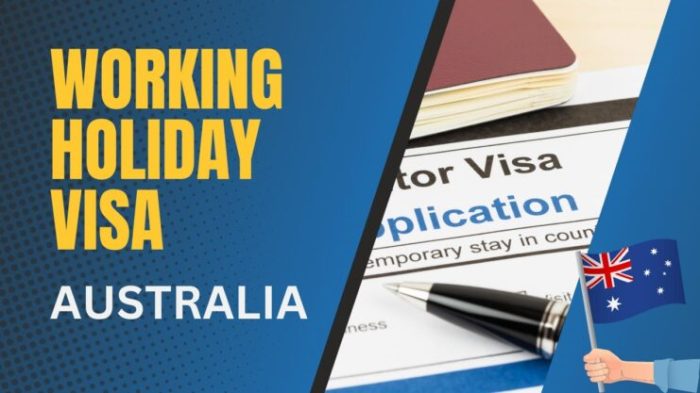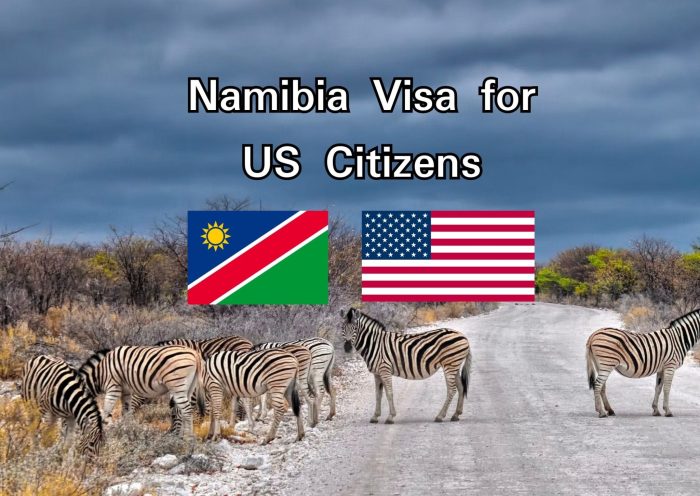Making the most of your Australian working holiday visa sets the stage for an unforgettable adventure. This comprehensive guide delves into every aspect, from understanding the visa itself to maximizing your work opportunities, managing your finances, and making the most of your leisure time. We’ll explore various visa types, employment strategies, budgeting tips, and cultural insights to help you make the most of your time Down Under.
From finding affordable accommodation to experiencing Australia’s vibrant culture, this guide will equip you with the knowledge and tools to navigate your working holiday experience with confidence. We’ll cover everything from essential visa requirements and application processes to practical tips for extending your stay and exploring potential pathways to permanent residency. Get ready to embark on an amazing journey!
Visa Overview
The Australian Working Holiday Visa (WHV) is a popular choice for young travelers seeking to experience Australian culture and gain valuable work experience. It allows eligible individuals to work and travel in Australia for a set period, offering a unique blend of exploration and employment. This visa is renowned for its flexibility and ease of application, opening doors to a wide range of employment opportunities across various sectors.This comprehensive overview delves into the intricacies of the Australian WHV, encompassing eligibility requirements, permitted activities, diverse visa types, the application process, and a detailed comparison of each visa category.
This guide empowers potential applicants with the knowledge needed to make informed decisions and maximize their Australian experience.
Eligibility Criteria
The Australian Working Holiday Visa has specific eligibility requirements for applicants. Generally, applicants must be between the ages of 18 and 30 and possess a passport from a qualifying country. Further details on these eligibility criteria and qualifying countries can be found on the official Australian government website. The requirements vary slightly between different visa types.
Permitted Activities
The Australian Working Holiday Visa permits a range of activities beyond simply working. Travel, leisure, and personal pursuits are integral parts of the experience. The visa grants the holder the freedom to explore Australia’s diverse landscapes and interact with its vibrant culture. This includes visiting iconic landmarks, participating in outdoor activities, and engaging in cultural experiences. However, the precise permitted activities are subject to the specific conditions Artikeld in each visa type.
Visa Types and Conditions
Australia offers different types of Working Holiday Visas tailored to specific needs and preferences. Each visa type has its own limitations and benefits, impacting the duration of stay, permissible work conditions, and other restrictions.
Application Process
Applying for an Australian Working Holiday Visa involves several crucial steps. Applicants need to gather specific documentation, complete online applications, and submit them according to the stipulated procedures. The process typically involves providing passport details, proof of age, financial resources, and other necessary supporting documents.
Comparison of Visa Types
| Visa Type | Duration | Work Permit Conditions | Permitted Activities |
|---|---|---|---|
| Working Holiday Visa (subclass 417) | Generally 12 months, but potentially 3 years for skilled workers | Limited to 6 months of full-time work, or 3 months for casual or part-time jobs, with flexibility to switch to other employment types. There are restrictions on the types of jobs available. | Travel, leisure, and personal pursuits. This visa also allows for work in various sectors, including hospitality, agriculture, and tourism. |
| Working Holiday Visa (subclass 462) | Generally 12 months. | Work for a maximum of 6 months in any one industry or occupation. Full-time work for up to 6 months, part-time for the remaining period. | Travel, leisure, and personal pursuits. |
| Subclass 417 (for certain professions) | Duration may be extended based on professional qualifications | May have additional employment requirements and conditions based on the profession. | Travel, leisure, and personal pursuits. |
Maximizing Work Opportunities

Securing employment during your Australian Working Holiday Visa is crucial for maximizing your experience and making the most of your time Down Under. This involves proactive research, understanding industry preferences, and tailoring your approach to specific roles and sectors. Knowing the landscape of available jobs and how to approach them will greatly enhance your overall visa experience.
Maximizing your Aussie working holiday visa means exploring beyond the usual tourist traps. Think about venturing off the beaten path, like discovering hidden gems in Eastern Europe, a region bursting with unique culture and stunning landscapes. For example, check out where to escape the crowds in eastern europe for some fantastic ideas. This kind of exploration will make your visa experience far more enriching and memorable, offering a true taste of the world.
Ultimately, it’s all about crafting an unforgettable adventure while making the most of your time in Australia.
Strategies for Securing Employment
A multifaceted approach to job searching is key for success. Leveraging online platforms, networking, and direct application to potential employers are all vital steps. Don’t limit yourself to one avenue; exploring multiple options increases your chances of securing a suitable position.
Identifying Suitable Industries and Job Roles, Making the most of your australian working holiday visa
Australia’s diverse industries offer numerous opportunities for working holiday visa holders. Hospitality, tourism, and agriculture are consistently popular sectors. Within these industries, various roles are available, ranging from entry-level positions to more specialized roles, depending on your skills and experience.
Researching and Identifying Suitable Work Opportunities
Thorough research is essential for identifying suitable work opportunities. Utilize online job boards, company websites, and social media to uncover potential employers and vacancies. Tailoring your resume and cover letter to specific job descriptions increases your chances of getting noticed. Networking with people in the desired industry can provide invaluable insights and lead to potential job openings. Staying informed about industry trends and emerging opportunities can also give you a significant advantage.
Common Work Sectors and Roles
| Work Sector | Specific Roles | Potential Employers | Entry Requirements |
|---|---|---|---|
| Hospitality | Restaurant Servers, Bar Staff, Kitchen Hands, Waitstaff, Hotel Receptionists | Restaurants, Hotels, Cafes, Resorts | Often, prior experience is helpful, but enthusiasm and a positive attitude are highly valued. Basic communication skills are essential. |
| Tourism | Tour Guides, Activities Coordinators, Customer Service Representatives, Travel Agents | Tour Operators, Travel Agencies, Tourist Attractions | Strong communication skills, ability to work with the public, and a willingness to learn about local attractions are beneficial. Some roles may require certification or training. |
| Agriculture | Farmhands, Fruit Pickers, Vineyard Workers, Tractor Operators | Fruit Orchards, Farms, Vineyards, Agricultural Businesses | Physical fitness and willingness to work outdoors are essential. Some experience may be required for more technical roles. |
| Retail | Sales Assistants, Cashiers, Shop Assistants | Retail Stores, Shopping Centers | Excellent customer service skills and a good understanding of retail procedures are necessary. |
| Construction | Labourers, Site Assistants, Trainees | Construction Companies, Building Sites | Physical strength and stamina are crucial. Basic knowledge of construction practices can be beneficial. |
This table provides a general overview. Specific requirements may vary depending on the employer and the particular role. Always thoroughly research the specific job description and contact potential employers for further details.
Maximizing your Aussie working holiday visa? Learning how to truly immerse yourself in a new culture is key. For example, checking out how to explore Norway like a Norwegian could provide fantastic insight into how to travel smarter and experience the local scene more authentically. how to explore norway like a norwegian This kind of local knowledge can elevate your whole experience and help you get the most out of your time abroad, whether it’s in Norway or elsewhere.
Accommodation and Finances
Juggling work, travel, and a budget is a key part of making the most of your Australian Working Holiday Visa. Understanding affordable accommodation options and developing smart budgeting strategies are crucial for a smooth and enjoyable experience. This section dives deep into practical tips for managing your finances while exploring the diverse landscapes and vibrant culture Australia offers.
Affordable Accommodation Options
Finding budget-friendly accommodation is essential for maximizing your visa’s value. Options range from hostels and guesthouses to shared apartments and even house-sitting opportunities. Hostels, with their social atmosphere and often included amenities like kitchens, are popular among budget-conscious travelers. Guesthouses offer a more private alternative, often with shared kitchen facilities. For longer stays or more privacy, consider looking into shared apartments, which can be significantly cheaper than individual rentals.
Maximizing your Australian working holiday visa experience is all about finding unique opportunities. Think beyond the usual tourist traps and consider places like the ARC Visitor Centre Svalbard arc visitor centre svalbard for a truly unforgettable adventure. These kinds of experiences will enrich your memories and stories long after your visa expires, making the most of your time Down Under even more rewarding.
Budgeting Strategies for Your Visa
Effective budgeting is paramount for any working holiday visa holder. A well-structured budget allows you to track expenses, prioritize spending, and save for future adventures. Create a detailed spreadsheet or use budgeting apps to monitor income and expenses. Prioritize essential costs like accommodation and food. Allocate a portion of your earnings towards savings and emergencies.
Consider using a budgeting app to automate saving a percentage of your income.
Saving Money and Reducing Expenses
Savvy money management is key to making the most of your time in Australia. Look for opportunities to reduce expenses without compromising your experience. Cook your own meals whenever possible, taking advantage of local markets and supermarkets for affordable groceries. Utilize public transport or walk whenever feasible to avoid costly taxi or ride-sharing services. Embrace free activities like exploring parks, hiking, or visiting free museums and galleries.
Take advantage of free walking tours to explore cities without spending extra on guided tours. Look for discounts or deals on activities through websites or apps like Groupon.
Estimated Costs in Different Australian Locations
| Location | Accommodation (Weekly) | Food (Weekly) | Transportation (Weekly) | Activities (Weekly) |
|---|---|---|---|---|
| Sydney | $200-$400 | $150-$250 | $50-$100 | $50-$150 |
| Melbourne | $180-$350 | $120-$200 | $40-$80 | $40-$120 |
| Brisbane | $150-$300 | $100-$200 | $40-$70 | $30-$100 |
| Perth | $180-$350 | $120-$220 | $50-$90 | $40-$120 |
| Gold Coast | $180-$350 | $120-$200 | $40-$80 | $50-$150 |
Note: These are estimated costs and can vary significantly based on your choices and lifestyle. Consider factors like accommodation type, food preferences, and activity levels when planning your budget.
Experiences and Activities
Australia beckons with its stunning landscapes, vibrant cities, and unique culture. Making the most of your working holiday visa means immersing yourself in these experiences, connecting with the local community, and creating memories that will last a lifetime. This section will explore how to maximize your leisure time, engage in cultural activities, and prioritize safety while experiencing the best of Australia.
Maximizing Leisure Time and Cultural Experiences
Australia offers a diverse range of activities for every interest. From exploring iconic landmarks to experiencing indigenous culture, there are countless ways to fill your free time. Embracing the Australian spirit of adventure and discovery is key to enriching your experience.
Popular Tourist Destinations and Activities
Australia’s diverse landscapes and vibrant cities offer a plethora of destinations. Sydney, with its iconic Opera House and Harbour Bridge, is a must-see. Melbourne, known for its vibrant arts scene and café culture, offers a different vibe. The Great Barrier Reef, a world-renowned natural wonder, provides opportunities for snorkeling, diving, and boat tours. For the adventurous, Uluru-Kata Tjuta National Park offers a chance to hike among stunning sandstone formations.
Consider your interests and allocate time accordingly to maximize your experience.
Connecting with Local Communities and Engaging in Social Activities
Engaging with the local community is an integral part of experiencing Australia. Joining local clubs, attending community events, or volunteering can help you connect with people and learn about their lives. Joining a hiking group, or a surfing class, is another way to meet like-minded people. Don’t be afraid to strike up conversations with locals; Australians are generally friendly and welcoming.
Safety Precautions and Emergency Plans
Staying safe is paramount during your travels. Always be aware of your surroundings, especially in unfamiliar areas. Inform someone of your itinerary and let them know where you are staying. Familiarize yourself with local emergency numbers and have a plan in place in case of any issues. This includes knowing how to get to the nearest hospital or police station.
Minimizing the Risk of Scams and Financial Fraud
Be cautious of unsolicited offers or requests, particularly when traveling. Stick to reputable tour operators and accommodation providers. Avoid sharing personal information with strangers, and keep a close eye on your belongings. Using secure payment methods and being aware of potential scams are crucial to maintaining financial security.
Tourist Destinations, Activities, and Potential Costs
| Destination | Activity | Estimated Cost (AUD) |
|---|---|---|
| Sydney | Opera House Tour | $50-$100 |
| Great Barrier Reef | Snorkeling Tour (Half-Day) | $150-$250 |
| Uluru-Kata Tjuta National Park | Guided Tour and Hike | $100-$200 |
| Melbourne | Melbourne Museum Entry | $30-$40 |
| Gold Coast | Surfing Lesson | $80-$150 |
Note: Costs are estimates and may vary based on the time of year, specific tour operator, and chosen activities.
Visa Extensions and Beyond
The Australian Working Holiday Visa offers a fantastic opportunity to experience the country and potentially build a future there. Beyond the initial visa period, various avenues for extending your stay and exploring permanent residency options exist. Understanding these pathways is crucial for making the most of your time and achieving your goals.
Possible Visa Extensions
Australian working holiday visas often have provisions for extensions, allowing visa holders to stay longer. The eligibility criteria and specific conditions vary depending on the visa type and individual circumstances. Factors such as the length of your initial stay, the number of jobs held, and your financial situation are frequently considered. Some extensions might require evidence of substantial work experience, language proficiency, or participation in Australian community activities.
This process usually involves applying through the appropriate channels and meeting the Artikeld requirements.
Options After the Initial Visa Period
After your initial working holiday visa expires, you have several options. You could choose to return home, or you could apply for a different visa category, such as a skilled migration visa. These visas are often based on specific skills and qualifications, potentially leading to permanent residency. Alternatively, some visa holders choose to return to their home country, having fulfilled their initial goals and experiences.
Ultimately, the decision depends on your personal circumstances, goals, and the opportunities available.
Pathways to Permanent Residency
Australia offers various pathways to permanent residency for skilled workers. The skilled migration program is a prominent route, often requiring specific skills in high-demand occupations. You might need to meet certain English language proficiency requirements, have the necessary qualifications, and potentially have work experience in Australia. Another route is through family sponsorship, where a family member already residing permanently in Australia can sponsor you.
Each pathway has its specific requirements and application processes.
Examples of Skills Gained
The working holiday visa allows for the development of diverse skills. For instance, you could gain experience in a particular industry, improve your language skills, and cultivate valuable work habits. These skills are demonstrably useful for future employment and visa applications. Practical experience in Australian workplaces, alongside the acquisition of language proficiency, is particularly valuable in showcasing your suitability for skilled migration programs.
Table: Visa Extensions and Future Immigration
| Scenario | Visa Extension Options | Potential Future Immigration Pathways | Example Skills Gained |
|---|---|---|---|
| Working holiday visa nearing expiry, seeking to extend stay | Apply for a further extension based on meeting specific conditions. | Consider applying for a skilled migration visa, focusing on occupations in high demand. | Improved language skills, specific industry experience, work ethic. |
| Initial visa expired, no extension sought | Return home and plan future travel. | Return to home country, or explore other visa options in the future. | Gained cultural insights, enhanced independence, experience in a different culture. |
| Initial visa expired, seeking permanent residency | Apply for a skilled migration visa matching your skills and qualifications. | Gaining permanent residency through a skilled migration program, or family sponsorship. | Proficiency in a sought-after skill, language proficiency, experience in Australian workplaces. |
Essential Tips and Advice
Embarking on a working holiday visa journey in Australia requires careful planning and a thorough understanding of the local context. This section provides crucial tips and advice to help you navigate the experience smoothly, ensuring you maximize your time and stay safe while exploring this wonderful country.Understanding your rights and responsibilities, effective communication, and cultural sensitivity are vital for a positive and enriching experience.
This guide provides practical insights into these key areas, helping you make the most of your time in Australia.
Navigating the Australian Working Holiday Experience
Australian working holiday visas offer a fantastic opportunity to explore the country and gain valuable work experience. To make the most of this unique experience, consider these key points:
- Research thoroughly: Before departing, extensively research the specific industries, locations, and types of work available in your area of interest. This pre-departure research will help you tailor your search and enhance your job prospects. Many online resources, including government websites and industry-specific platforms, provide comprehensive information about job markets and employment opportunities.
- Develop a flexible approach: Australian employment often involves flexibility. Be prepared to adjust your plans and embrace opportunities that may not perfectly match your initial expectations. This adaptability is crucial for securing work and navigating potential changes.
- Maintain clear communication: Maintain open communication with employers and colleagues, clearly outlining your expectations and needs. This helps prevent misunderstandings and fosters a positive working relationship.
Legal Rights and Responsibilities
Understanding your legal rights and responsibilities is essential for a smooth and safe experience. These rights and responsibilities will be clarified by the Australian government’s official documents and the Australian workplace relations authorities.
- Know your employment rights: Familiarize yourself with your employment rights as a working holiday visa holder. This includes understanding minimum wage, working hours, leave entitlements, and other protections Artikeld in Australian employment laws.
- Adhere to Australian labor laws: Complying with Australian labor laws is paramount. Ensure you understand and adhere to workplace safety regulations, and report any unsafe work conditions. Seek assistance from appropriate authorities if needed.
- Respect Australian laws: Complying with all Australian laws and regulations is essential for a smooth and safe experience. Familiarize yourself with the laws regarding traffic, public conduct, and other regulations.
Communication Strategies
Effective communication is key to navigating daily life in Australia. Building rapport with locals and understanding their communication styles is crucial.
- Learn basic Australian phrases: Knowing basic phrases like “hello,” “thank you,” “excuse me,” and “sorry” can greatly enhance your interactions. This demonstrates respect and enhances your communication skills.
- Be mindful of body language: Be aware of cultural nuances in body language. Different cultures may interpret gestures differently. For example, some gestures may be considered rude or inappropriate in certain contexts.
- Use appropriate language: Using respectful and appropriate language in all interactions, particularly in professional settings, is essential. Avoid slang or informal language that might be misunderstood.
Cultural Awareness and Etiquette
Cultural sensitivity is crucial for a positive experience. Understanding Australian culture and customs will enhance your integration into society.
- Be open-minded: Embrace different perspectives and be open to new experiences. Open-mindedness fosters a welcoming environment for interactions.
- Respect Australian customs: Familiarize yourself with Australian customs and traditions, and show respect for them. This includes understanding local customs, traditions, and practices.
- Be mindful of personal space: Australians typically maintain a certain level of personal space. Respect this space during interactions and social gatherings. This shows respect and understanding of social etiquette.
Emergency Contacts, Legal Information, and Resources
This table provides crucial emergency contacts, legal information, and helpful resources for Australian working holiday visa holders.
| Category | Information |
|---|---|
| Emergency Contacts | Australian Embassy/Consulate, Local Police, Emergency Services (000) |
| Legal Information | Australian Government website for visa information, Fair Work Ombudsman |
| Helpful Resources | Local community centers, English language support groups, Tourist information centers |
Final Thoughts: Making The Most Of Your Australian Working Holiday Visa

In conclusion, maximizing your Australian working holiday visa involves a blend of preparation, resourcefulness, and a willingness to embrace the unique experiences Australia offers. By understanding the visa process, exploring work opportunities, managing your finances wisely, and engaging with the local culture, you can create lasting memories and gain valuable life experiences. This guide provides a roadmap to help you make the most of your time in Australia, ensuring your working holiday is truly extraordinary.




